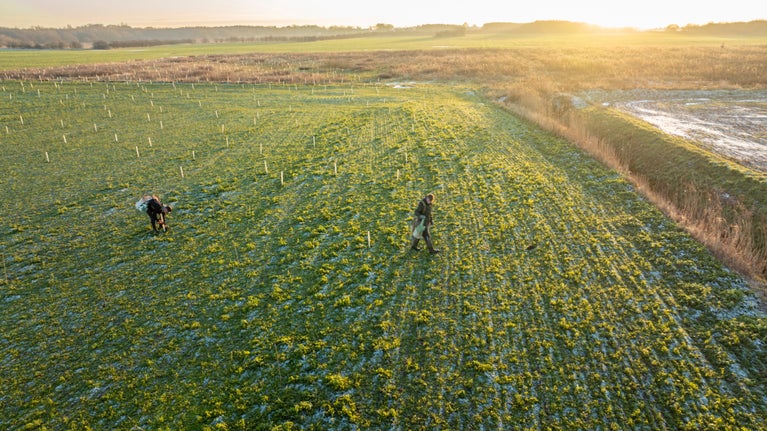
Tackling climate change
Uncover how we’re responding to the changing climate at places in our care.

As part of the Reimagining a Hampshire Estate project at Hinton Ampner, we’re switching to regenerative farming methods. This will improve soil quality, reduce the impact on nature and the environment and increase wildlife habitats. We’re working with a farming partner to manage these changes, focusing on environmental rather than commercial targets.
Modern commercial farming practices can strip the soil of life, destroy its structure and leave it more prone to erosion and to run off of toxic chemicals into the land and rivers.
We'll be restricting the use of chemical fertilisers and using regenerative farming practices to improve and protect the soil and the wider environment.
We’ve started by planting fields with a range of species designed to put nutrients back into the soil and to help improve its structure. These fields will be grazed by cattle, providing them with healthy food and the soil with natural fertiliser.
When we plant crops, the soil will be disturbed as little as possible, with minimal tillage.
We’ll improve soil health further by giving it time to rest and recover between crops, and by rotating the types of crops we grow.
Growing a wider variety of plants increases the diversity of microbes in the soil and allows the soil to lock away carbon that would otherwise contribute to global warming.

By drastically reducing the level of toxic chemicals that enter the soil and water systems, we’ll help protect plants and wildlife. But we’ll be taking more active steps to increase biodiversity, too.
Around each of the fields we farm, we'll leave wide borders where important wild plants, flowers and fungi can grow, creating habitats and food for key species of birds, bats, butterflies and small mammals like harvest mice and dormice.
There will also be areas within the fields specially planted with winter food for birds.
We'll plant fruit and nut trees too, including 200 apple trees. These will provide further wildlife habitats, as well as removing carbon dioxide from the air.
The cattle we raise will help us maintain important habitats like chalk grasslands by grazing in specific places around the estate.

Our farming partner will produce grass-fed, native-breed beef, sustainable crops like wheat, oats and barley, as well as fruits and nuts.
We’ll also sell honey and other produce from the estate at local outlets.

Uncover how we’re responding to the changing climate at places in our care.
Everything you need to know about this project to transform the estate into a more vibrant, accessible and sustainable place where people and nature can thrive.

Discover how our Reimagining a Hampshire Estate project will increase the diversity of wildlife here by creating and reclaiming natural habitats.

Discover how the Reimagining a Hampshire Estate project will give visitors more room to roam and make nature accessible to everyone.

As the Reimagining a Hampshire Estate conservation project unfolds, there will be plenty of opportunities for visitors and the local community to get involved and share their experiences.